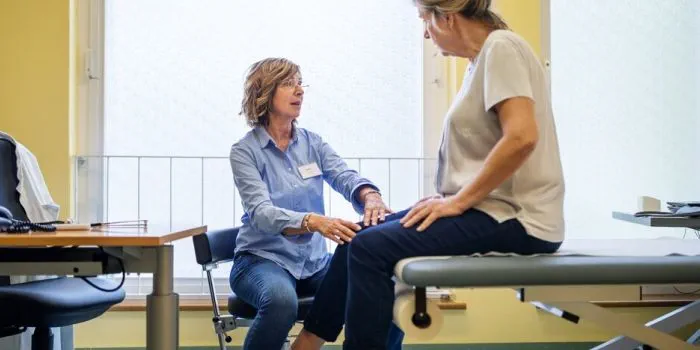When should you go to the pharmacy vs the GP?
Sometimes, it can be difficult to know when you should see a doctor and when a pharmacist would be better. Here, I’ll explore the types of conditions and illnesses a pharmacist can support you with, as well as when it’s best to see a GP.

What can a pharmacist help with?
Pharmacists are qualified healthcare professionals. Most pharmacists have studied for at least five years, and many have had years of experience since qualifying. They have become experts in medicines – both those that are prescribed but also those available over the counter. So, they know what their uses are, what the side effects could be, and what to avoid while you’re taking them. They also understand how your body works and can offer you heath advice about minor issues.
Help with minor issues
In case you’re not sure about what counts as a minor health issue, the type of things pharmacists can help with include:
- sore throats and coughs
- stomach upsets
- cold and flu
- aches and pains
- fungal infections such as athlete’s foot
- mouth ulcers
- constipation
- emergency contraception
- hay fever
To help you with these issues, pharmacists can offer you over the counter medicines which are appropriate for your condition. They can tell you how to take them safely as well as identify any possible contraindications (reasons why you shouldn’t take them).
Pharmacists can also offer general health and wellbeing advice. Many pharmacies open at convenient times, including some evenings and weekends. And it’s usually possible to find a pharmacy which is open until midnight or later.
Some pharmacists have done additional training to enable them to treat minor illnesses, and some can prescribe specific medication that you cannot buy over the counter. Pharmacists can often help you decide if you need to see a GP initially or whether you can try some other approaches first.
Wellbeing services
Pharmacists can also usually offer you a range of general wellbeing services. These can include things such as blood pressure checks and stop smoking advice. Some pharmacies offer flu and travel vaccinations too, as well as anti-malarial tablets.
You may be able to access additional services such as weight management programs, chlamydia checks, or substance misuse support as well – so check which services your local pharmacy provides.
Medicine checks
You can get help with using certain new medicines via the New Medicine Service. Here, pharmacies can offer you detailed advice and support to use new medicines if you have conditions such as:
- asthma and COPD
- type 2 diabetes
- heart failure
- high blood pressure
This includes a series of appointments, beginning when you first start your new medication, and then later on – to see how you are getting on. It can help you to work out a plan for when to take your medication, how to manage side effects and other lifestyle considerations.
When should you see a GP?
It’s a good idea to see a GP if you have new or ongoing symptoms or are worried about your health.
Unlike pharmacists, doctors are trained to diagnose conditions, run appropriate tests, and prescribe a wider range of medications. They can also refer you to the relevant expert if this is required.
It’s hard to list every possible symptom which would require a visit to the doctors, but here are a few of the types of things that you should discuss with a GP:
- unexpected weight loss
- a persistent cough or breathlessness
- unexplained bruising or bleeding
- skin lesions that will not heal
- changing moles
- new lumps or bumps
- digestive issues such as persistent indigestion, persistent diarrhoea, or blood in your poo
- recurring urine infections
- low mood or anxiety
- ongoing pain (for example from your back, period or stomach)
A GP can offer you a wider range of medicine than you would be able to get over the counter from your pharmacist too. This can include:
- antibiotics (should you need them)
- ongoing birth control
- medication to reduce cholesterol or manage pain
If you are struggling to get a GP appointment or are confused about where to get help, then you can also call 111 for health advice. Here you can have your symptoms assessed and find out which type of support would suit your needs.
And, if you become unwell out of your GP opening hours, 111 can also refer you onto out of hours care if you need it.
You can’t predict when you might want to see a GP, but you can be ready for when you do. Our GP subscriptions are available to anyone over 18 and give you peace of mind, with 15-minute appointments when it suits you at no extra cost.
-
Sources Sources
- How your pharmacy can help. NHS. www.nhs.uk, accessed 17 April 2023
- Personal communication with Dr Petra Simić , Medical Director, Bupa Health Clinics April 2023
- New medicine service. Pharmaceutical services negotiating committee. www.psnc.org.uk, updated February 2023
- When to see your GP. NHS. www.wuth.nhs.uk, accessed 18 April 2023
- Cancer symptoms. Cancer research UK. www.cancerresearchuk.org, accessed 18 April 2023
About our health information
At Bupa we produce a wealth of free health information for you and your family. This is because we believe that trustworthy information is essential in helping you make better decisions about your health and wellbeing.
Our information has been awarded the PIF TICK for trustworthy health information. It also follows the principles of the The Information Standard.

More general health advice articles
Did you find our advice helpful?
We’d love to hear what you think. Our short survey takes just a few minutes to complete and helps us to keep improving our healthy lifestyle articles.
Legal disclaimer
This information was published by Bupa's Health Content Team and is based on reputable sources of medical evidence. It has been reviewed by appropriate medical or clinical professionals and deemed accurate on the date of review. Photos are only for illustrative purposes and do not reflect every presentation of a condition.
Any information about a treatment or procedure is generic, and does not necessarily describe that treatment or procedure as delivered by Bupa or its associated providers.
The information contained on this page and in any third party websites referred to on this page is not intended nor implied to be a substitute for professional medical advice nor is it intended to be for medical diagnosis or treatment. Third party websites are not owned or controlled by Bupa and any individual may be able to access and post messages on them. Bupa is not responsible for the content or availability of these third party websites. We do not accept advertising on this page.







